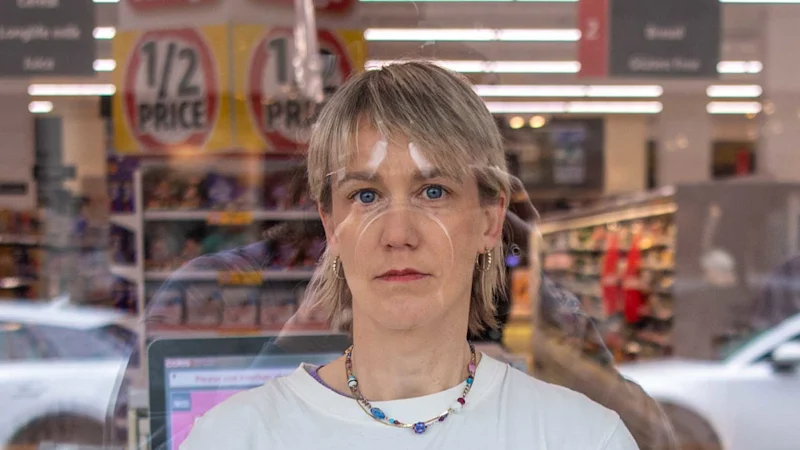
For the past three years, volunteers have scoured supermarkets for annual surveys of the four largest supermarket groups – Coles, Woolworths, Aldi and Metcash (which owns the IGA, Foodland, Supa Valu and Campbells brands) – to gauge their plastic problems.
The Unwrapped 2025 report, prepared by AMCS and Boomerang Alliance and released on Tuesday, shows Aldi scored lowest for its unnecessary use of single-use plastic packaging, and its lack of transparency over its increase or reduction, followed by Coles, Metcash and Woolworths, in that order.
Consumers are paying more for trying to avoid plastic packaging they never asked for.Credit: Australian Conservation Marine Society/Stephen Kiprillis
Consumers are paying more for trying to avoid plastic. In 73 per cent of visits, at each of the supermarkets surveyed, it cost more to buy loose produce than its equivalent wrapped in plastic.
At Aldi, for example, loose brown onions cost $3.49 a kilo, while a kilo of packaged brown onions cost $2.99.
AMCS found that for more than 20 per cent of packaged produce found at Aldi, there was no alternative for loose produce. This compared with 12 per cent at Woolworths and 4 per cent at Coles.
Program manager Tara Jones said oranges, for example, averaged $4.24 per kilogram loose, compared with $2.49 per kilogram pre-packaged.
“People just want to buy their groceries without a bin full of plastic at the end of the week.”
One of the most widely hated items in the fresh food section is plastic fruit stickers. Each year 110 tonnes of fruit stickers are peeled off fruit and vegetables, thrown into landfill, or find their way into waterways and compost.
Boomerang Alliance director Jeff Angel said 140,000 tonnes of plastic entered the Australian environment each year.
Photos taken by volunteers show shoppers can save $1.50 by buying two kilograms of red potatoes wrapped in plastic, compared with loose.Credit: Graphic: Stephen Kiprillis
“Research shows us that the more plastic that gets produced, the more plastic ends up polluting our environment,” he said.
“Packaging now makes up 58 per cent of litter collected by Clean Up Australia volunteers, much of which comes from the supermarket shelf.”
A Woolworths spokesman said the company was “proud of the work we’ve done, and the success we’ve achieved with the packaging we control”.
“We’ve removed more than 20,000 tonnes of virgin plastic from our Own Brand packaging since 2018, and achieved an average recycled content for packaging of 52 per cent, meeting the National Packaging Target set by the federal government,” he said.
“Much of our fruit and veg range is sold loose. However, we do sell some packaged items to offer produce in bulk and that is easier to carry, or to extend shelf life. And when it comes to bulk packs of fruit or vegetables, we can often provide a lower price per kilo by selling a larger volume.”
Processed cheese, with each slice individually wrapped, was singled out as a bad example of plastic waste.Credit: Bianca Hall
The AMCS report also took aim at online shopping. Volunteers placed 12 delivery orders each with Coles and Woolworths (the two major supermarkets being the ones consistently offering online orders).
Even when shoppers selected loose produce, the report found, 10 of the 12 Coles online orders included produce bags, including one example where a produce bag held a single bulb of garlic.
Woolworths fared better.
A Coles spokeswoman said the company was committed to “not just reducing but removing unnecessary plastic across our stores and online, while also making it easier for customers to recycle packaging wherever possible”.
“At the same time, we recognise the crucial role packaging plays in delivering convenience, protecting fresh produce during transport, maintaining food safety and hygiene, extending shelf life, and ultimately helping to reduce food waste.”
An Aldi spokesman said the company would publish its latest sustainability report within the next few weeks.
“Making our packaging more sustainable is important to us, and we work closely with our suppliers to improve the circularity of our packaging in Australia,” he said.
Loading
“The report will show that, as at the end of 2024, 87.1 per cent of Aldi’s exclusive brand packaging is now recyclable, reusable or compostable, which reflects our dedication to minimising waste across the whole supply chain.”
A Metcash spokeswoman said the company “continued to work closely with suppliers and the independent retail stores in our network to phase out and reduce problematic plastic packaging materials”.
“When it comes to fresh produce, the majority of IGA stores source directly from local producers. That said, we are working closely with independent retailers, our suppliers and packaging partners to expand loose options, minimise single‑use plastics and create solutions that reduce food waste and emissions without compromising safety.”
On Sunday, the NSW government announced it would phase out a further range of single-use plastics in stages, including fruit and vegetable stickers, and fish-shaped soy sauce containers, by 2030.
Get to the heart of what’s happening with climate change and the environment. Sign up for our fortnightly Environment newsletter.





